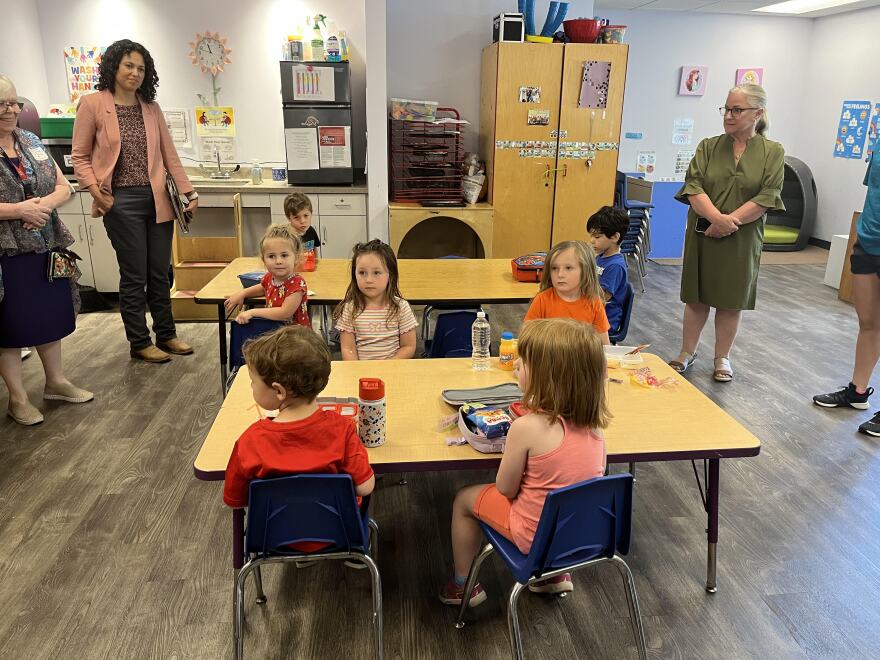PEN ARGYL, Pa. — They should be here to see the impact, said U.S. Rep. Susan Wild, PA-7th District.
They should get out of their offices and visit places like the local branch of the Greater Valley YMCA, where federal funding initiatives like the USDA’s Summer Nutrition, or SUN, Program provide healthy meals and snacks during the summer for kids who might otherwise go hungry.
They, Wild explained, are her colleagues in Congress who don't view such funding as a priority.
“I worry that some of my colleagues don’t do enough of getting out in their communities to understand that there are people that are really struggling,” Wild said after she and USDA Deputy Secretary Xochitl Torres Small toured the YMCA’s summer nutrition program on Thursday.
“Because if they did, I don't know how they could possibly vote against these kinds of programs.”
Wild, Small and state agency administrators in charge of food insecurity and child nutrition programs toured the facility, including and specifically the child care and summer camp classrooms where children were having lunch.
“This program makes a huge difference, knowing that if you’re a parent and struggling with costs, that you can take your kid to a camp like this and be able to receive free food.”Xochitl Torres Smith, USDA deputy secretary
As Wild and Small visited a preschool classroom during lunch, they were moved upon being gifted posters of appreciation.
Eleanor Kohler, age 3, approached them and handed each a poster with pictures of fruits and vegetables with the message: Thank You for Your Support.
“I had the chance to talk with some of the kids,” said Small. “I asked one what was their favorite thing about summer camp. They said it was the food.
“This program makes a huge difference, knowing that if you’re a parent and struggling with costs, that you can take your kid to a camp like this and be able to receive free food.”
The USDA launched the Summer Nutrition Program for kids in May. In January 2023, Congress approved a $29 billion investment in meals programs for kids.
How vital is the USDA program? One in four US children are food insecure, meaning they are not sure where their next meal is coming from.
In the Lehigh Valley, 10.7% of residents are food insecure, an increase from 7.8% pre-COVID.
Additionally, the percentage of food insecure children is 15%, an increase from 13% pre-COVID.
Food insecurity, or lack of access to enough nutritious food, can have serious consequences on people’s health and well-being.
SUN Meals and SUN Bucks, a new USDA program that provides $120 in summer grocery benefits for eligible children, are key to the Biden-Harris Administration’s efforts to lower food costs and address childhood food and nutrition insecurity, which is higher in the summer months when school is out.
Nearly 30 million children participate in the USDA’s school breakfast and lunch programs.
But when school is out during summer, kids lose access to those vital meals. The SUN programs offer more options for families to conveniently access the essential nutrition children need to thrive, learn and grow during summer and beyond.
“We prepare our food on-site,” said Maribel Tandazo, YMCA senior director of community impact. “We also explore new foods for the children.
“We try to respond to the kids to give them foods they like that are healthy. If they don’t like them, we try again. We know that children who receive daily healthy foods are set up to succeed.”

The YMCA’s Summer Food Service Program is offered to:
Day Camp participants in area eligible locations at five branches including: Allentown branch, Bethlehem branch, Easton branch, Suburban North branch and Slate Belt branch.
Community Free Sites that provide one meal service at no cost to youth 18 and under at 12 sites, including Allentown, Bethlehem and Suburban North branches; LG Stewart, Elmwood and Fairview Parks in Bethlehem; Centennial and Vanderveer parks in Easton; Eddyside and Heil pools in Easton; Easton Area Neighborhood Center and Easton Area Housing Authority.
“When it comes to USDA programs, it’s really about connecting our kids and our future with farmers who work hard to grow this food,” Small said.


